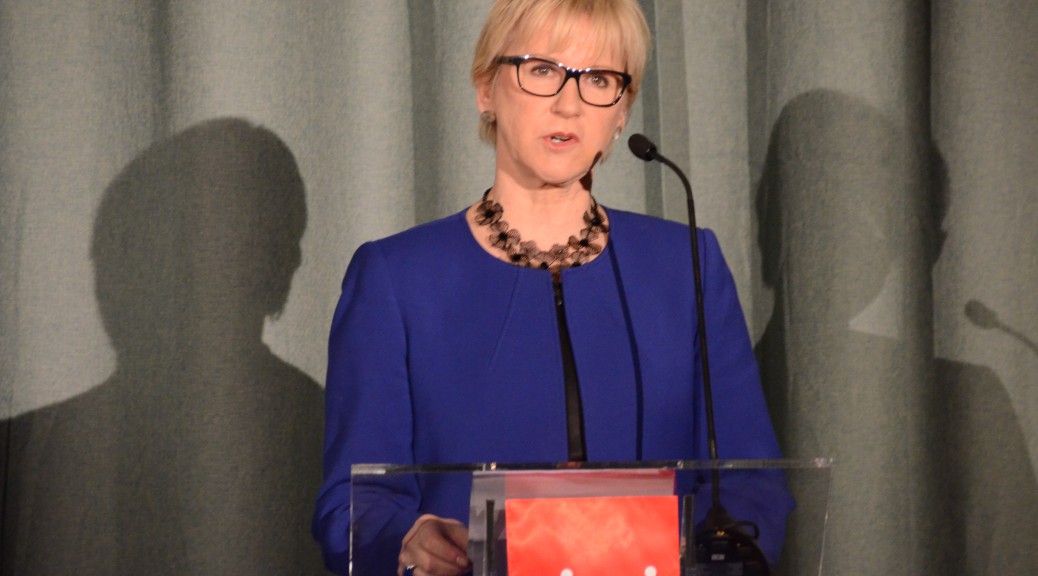
She was treated as a good example of translating scientific achievement into policies and applied in communities.
In its citation, The Stockholm Water Prize Nominating Committee said that “The nexus of water-related microbiology, water quality and public health is rife with uncertainty – in both theory and practice. The world is blessed with few individuals who can tackle the increasing and changing challenges to clean water and health, starting from state-of-the-art science through dedicated and original research, then moving to professional dissemination, effective lobbying of the legislative arena, influencing practitioners, and raising the general awareness. Joan Rose is the leading example of this extremely rare blend of talents.”
After she received the Prize, Professor Rose said she was honored.
“As an individual it is an honour and I am overflowing with gratitude. But it means even more, because it is a prize that honours water, it honours the blue planet and it honours the human condition. Therefore, I am very proud”.
Joan Rose is widely regarded as the world’s foremost authority on the microorganism Cryptosporidium. In 1993, the largest outbreak to date of the intestinal parasite Cryptosporidium affected more than 400 000 people in Milwaukee, US, who got sick from contaminated drinking water. 69 people died in the outbreak. Cryptosporidium, which exists in both humans and animals, cannot be killed by chlorine, and lives for several months.
Professor Rose and her team, whom she calls “water detectives” investigate waterborne disease outbreaks globally, to determine how they can be stopped, and prevented. She was the first person to present the widespread occurrence ofCryptosporidium in water supplies in 1988.
“More than two billion people still lack adequate sanitation, and over one billion lack access to safe drinking water. Hundreds of thousands of deaths from diarrhoeal diseases each year could be prevented by improved water, sanitation and hygiene. Joan Rose, our water hero, is a beacon of light in the quest for securing a better, healthier life for this and future generations,” commented SIWI’s Executive Director Torgny Holmgren.
Talking about what she believes is the world’s greatest water challenge, Professor Rose said: “I think it is going to be the reversal of water quality problems around the world; the algal blooms in fresh water and coastal waters, and the pollution, not just associated with humans, but also with disease outbreaks among our wildlife, like amphibians and fish. I also think reconnecting water and food security will be a major challenge. We are starting to do it but it will definitely continue to be a challenge.”
Professor Rose was key in establishing the 2004 WHO Drinking Water Standard, setting out a new WHO paradigm with direct impact on virtually all countries; Rose also worked in Malawi and Kenya to help translate these into local regulation. UNESCO’s International Hydrological Program asked for her leadership in meeting its goals of resource management and capacity building for Member States. She chaired a specialist group within the International Water Association to ensure understanding and incorporation of updated standards at the state and national level in engineer standards around the world. Her expertise in identifying and prioritizing issues of water quality led to codification of the Great Lakes Water Quality agreement. She Chairs Singapore’s Water Audit Panel of the influential Public Utilities Board; Canada and Korea sought her guidance. And to use today’s technology, she established an online collective of 140 scientists in the Global Water Pathogens Project.
The Stockholm Water Prize is a global award founded in 1991 and presented annually by Stockholm International Water Institute (SIWI) to an individual, organization or institution for outstanding water-related achievements. H.M. King Carl XVI Gustaf of Sweden is patron of the prize. The Stockholm Water Prize Founders, united in their strong conviction to drive sustainability in the water sector, are: Bacardi, Borealis & Borouge, Europeiska ERV, HP, Kemira, Poul Due Jensen Foundation, Ragn-Sells, Scandinavian Airlines (SAS), Snecma/Safran, Water Environment Federation (WEF), Xylem and Ålandsbanken.


































































































